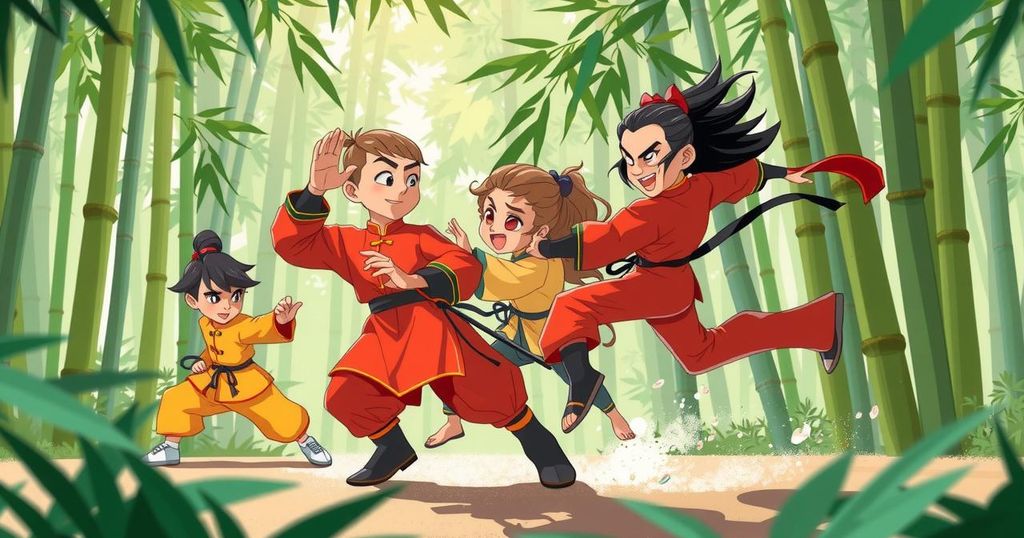AI in Hollywood vs. China: A Tale of Contrasting Approaches to Film
- Hollywood struggles with AI as artists voice concerns.
- China Film Foundation revitalizes kung fu classics using AI.
- The partnership aims to enhance storytelling through technology.
- John Woo’s classic may be reimagined through AI animation.
- Chinese officials promise stunning realism in remade films.
China’s Vigorous Pursuit of AI in Entertainment is Unmistakable
Hollywood’s complicated dance with artificial intelligence (AI) has become a hot topic, with studios grappling between cutting costs and responding to a rising tide of concerns from actors, directors, and crew members. Meanwhile, across the ocean in China, the AI narrative takes a different turn—one that’s more daring, more adventurous. The China Film Foundation, a government-backed nonprofit, is plunging headfirst into the AI realm, aiming to breathe new life into 100 kung fu classics such as “Police Story” and “Once Upon a Time in China,” featuring martial arts legends Jackie Chan and Jet Li respectively. This project presents a striking contrast to the resistance seen in Hollywood, where the debate often centers around ethical concerns rather than embracing the possibilities of AI in cinema.
Hollywood’s Reluctance Competes With China’s Open Mindset
The foundation grants an ambitious partnership with Shanghai Canxing Culture & Media Co., bringing Hong Kong films back to life for a younger generation through AI. Not to mention the plans for reimagining director John Woo’s classic, “A Better Tomorrow” into an animated experience using AI to craft what they call a new visual story. This move drew some gasps and nods of disbelief from American artists, who, in contrast, are voicing alarm over AI’s encroachment on creative expression. Their fears were echoed by the Directors Guild of America, which stressed that AI should enhance storytelling rather than distort an artist’s craft, hinting at resistance to what they see as potential threats to authenticity. This starkly reflects the clashing attitudes toward artificial intelligence as each country races to claim a position in a new, tech-dominated narrative.
Diverse Responses to AI in Film Lead to Discontent
Surely, a hint of skepticism looms when looking at America, where creatives express concerns about how AI is altering their works and potentially snatching away opportunities—just look at the ongoing struggles in negotiations around intellectual property rights. In China, however, a different reality flourishes, with 83% of the population believing AI operates in the best interest of society, in contrast to a mere 37% in the U.S. This dissimilarity pulls back the curtain on the environment—it’s not just about technology but the attitudes toward its integration into society and creative processes. A representative from the China Film Foundation, David Chi, mentioned key players like Jackie Chan are aware of the undertaking, implying constructive dialogue is on the horizon. Yet, there’s worry over rights and consents as the boundary between innovation and infringement blurs. Concerns are raised by not only industry veterans but also the families of icons like Bruce Lee as the foundation pushes forward without much communication on intellectual rights. This ongoing tension underscores a pivotal moment in both markets.
The Broader Implications for Cinema Jobs and Innovation
In a world where studios face lawsuits regarding how AI imitates iconic characters, like the beloved Yoda, the complexity of ownership and creativity layers itself heavily upon AI’s future role. Meanwhile, Chinese officials eagerly discussed how AI will add spellbinding realism to their cinematic creations. They imagine audiences immersed in a bamboo forest duel with the AI-enhanced environment. This vision speaks to an ambition that feels intense—the sort of drive that shapes a society willing to experiment, seemingly lacking the hesitation that dampens creativity in the West. But as discussions of job displacement arise, contrasting perspectives on potential losses highlight a reality check. After all, U.S. guilds seek tough protections against deepfakes, as job security transforms under the weight of evolving technology. This sets the stage for a dramatic clash as the two cultural powers grapple with the implications of AI on their storytelling traditions.
AI’s Role Sparks Debate Across Cultural Divides
In a nutshell, China’s venture into AI within its film landscape presents an intriguing chapter in the ongoing saga of technology and creativity. The move towards revitalizing classic martial arts films and building immersive storytelling experiences reveals a readiness to tackle challenges and seize opportunities for cultural storytelling and global outreach. And even as artists in the U.S. tread carefully with skepticism towards AI, the Chinese ambition seems unbounded and aligned with an unmistakable optimism. The still-unfolding story encompasses a bigger picture, raising familiar questions: How do we balance innovation with tradition? How do industries adapt in the face of technological upheaval? As these developments continue to evolve, it’s clear that the future of film—and indeed storytelling—is both exciting and uncertain.
In summary, the journey with AI in filmmaking creates a stark contrast between Hollywood’s cautious approach and China’s more exuberant embrace. As China seeks to remaster beloved films, merging AI with cultural narratives allows for a potent mix of innovation and responsibility. Meanwhile, American artists remain vigilant about protecting their work in the face of potential AI-driven disruptions. The ongoing dialogue about artificial intelligence suggests an imminent reshaping of the film industry that will likely sculpt how stories are told for years to come.




